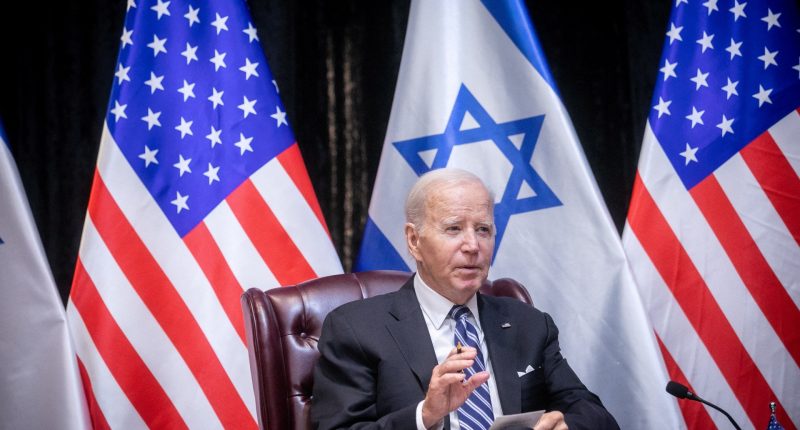United States President Ronald Reagan’s order to Israeli Prime Minister Menachem Begin to put an end to his “holocaust” in Lebanon is perhaps the best-known political anecdote from Israel’s 1982 invasion.
Less known, however, is the enthusiastic defence for that very same “military operation” – dubbed “Operation Peace for the Galilee” – offered by a young democratic senator at a private meeting where Begin was being grilled by US lawmakers over Israel’s disproportionate use of force.
According to Begin, 40-year-old Delaware Senator Joe Biden delivered “a very impassioned speech” in support of Israel during a closed Foreign Policy Committee meeting in Washington, DC and said “he would go even further than Israel” and “forcefully fend off anyone who sought to invade his country, even if that meant killing women or children”.
Begin, a former leader of the Irgun, the notorious armed group that carried out some of the worst acts of ethnic cleansing during the creation of the state of Israel, including the 1948 Deir Yassin massacre, was by his own account stunned by Biden’s chutzpah.
“I disassociated myself from these remarks,” Begin later told Israeli reporters. “I said to him: ‘No, sir; attention must be paid. According to our values, it is forbidden to hurt women and children, even in war … Sometimes there are casualties among the civilian population as well. But it is forbidden to aspire to this. This is a yardstick of human civilisation, not to hurt civilians.’”
It turns out, Biden’s enthusiastic backing of Israel as it committed in Lebanon what Reagan deemed a “holocaust” was not a fad or anomaly.
Today, as president, Biden appears even more eager to legitimise and encourage Israeli aggression and international law violations than he was more than 40 years ago.
Since October 7, the Biden administration vetoed three United Nations Security Council resolutions calling for a ceasefire. Despite consequent polls demonstrating growing public support for a ceasefire, and the death toll in Gaza passing 30,000, the Biden administration stood firm in its position against a ceasefire until March 22, when it finally introduced its own resolution. The resolution, which stopped short of explicitly demanding Israel halt its campaign in Gaza, was vetoed by Russia and China for that very reason. On March 25, a revised version that included an unconditional call for a ceasefire was put to vote and passed with 14 votes in favour with the US abstaining.
The passing of the resolution calling for an “immediate ceasefire” for the rest of the Muslim holy month of Ramadan “leading to lasting peace” was interpreted by many as a sign that the pressure from the international community is finally getting to Israel’s staunch ally in the White House.
The resolution, however, was hardly a real threat to the continuation of Israel’s war on Gaza. It not only failed to include a call for a “permanent ceasefire”, as many UN members wanted, but also demanded the unconditional release of Israeli captives without even mentioning the thousands of Palestinians held without charges in Israel.
Furthermore, it was adopted under Chapter VI (Pacific Settlement of Disputes) of the UN Charter rather than Chapter VII (Action with Respect to Threats to the Peace, Breaches of the Peace, and Acts of Aggression). While Chapter VI resolutions are commonly described as legally binding, there is no consensus among legal scholars and jurists on whether they are legally enforceable. This allowed the US to dismiss the resolution as not legally enforceable and practically provided Israel with an excuse to completely ignore the ceasefire call from the UNSC.
In the end, what some interpreted as the belated softening of Biden’s pro-Israel position was nothing but smoke and mirrors.
In fact, while the world was busy discussing whether the US would finally allow the UNSC to pass a ceasefire resolution and whether that resolution could do anything to put an end to the devastation in Gaza, the Biden administration was working to push through another generous “relief” package for Israel.
The weekend before the vote on the amended ceasefire resolution on March 25, while leading human rights groups, health organisations and UN agencies were sounding the alarm over the threat of famine looming over Gaza, Biden signed into law a $1.2 trillion funding package which was approved by the US House of Representatives on Friday and passed by the Senate on Saturday.
The massive financial package, which helped the US avert a partial government shutdown, did not include $14.1bn in military aid for Israel the administration initially called for. Nevertheless, it provided Israel with concessions that are perhaps much more valuable to its war effort than any additional military aid would be.
On top of fully funding the annual US “security commitment” of $3.3bn for Israel, the bill banned US funding for the UN agency for Palestinian refugees (UNRWA), the main provider of aid and basic services to Palestinians in Gaza, until March 2025.
The US ban is tied to an unsubstantiated Israeli claim that about a dozen of the agency’s 13,000 employees in Gaza participated in the October 7 Hamas attacks. UNRWA Commissioner-General Philippe Lazzarini immediately terminated employees accused by Israel. He later called the terminations an act of “reverse due process” and admitted to having no evidence to support their firing. The six-page Israeli intelligence dossier on UNRWA employees’ alleged involvement in the October 7 attacks, which several donor countries cited in explaining their decision to suspend funding for the agency, was also found to contain no concrete evidence when reviewed by the United Kingdom’s Channel 4 and other news organisations.
The European Union and countries including Canada, Sweden, Denmark, and Australia subsequently resumed funding, while other contributors, including Saudi Arabia and Ireland, increased their donations. Just last week, Democratic US Senator Chris Van Hollen called the Israeli claims about UNRWA “flat-out lies”. None of these, however, seemingly convinced the Biden administration to resume funding for the UN agency providing life-saving aid to more than a million besieged civilians, mostly women and children, facing famine and indiscriminate bombardment.
Biden’s bill also includes a provision that would limit aid to the Palestinian Authority, which governs the occupied West Bank, if “the Palestinians initiate an International Criminal Court (ICC) judicially authorized investigation, or actively supports such an investigation, that subjects Israeli nationals to an investigation for alleged crimes against Palestinians”. This is shameless blackmailing of a people from pursuing their right to self-determination. The bill further withholds funds from the UN Human Rights Council for what it calls “anti-Israel” actions.
Consistent with Israel’s refusal to allow any independent investigations into its conduct against Palestinians, the bill also eliminates funding to the Independent International Commission of Inquiry on the Occupied Palestinian Territory which has a mandate to investigate war crimes.
The UN and other international organisations funded in the bill are directed to assess and report on attempts to combat “anti-Israel” bias.
Moreover, the bill puts new conditions on assistance to Gaza, such as coordination with Israel, prevention of diversion to the Palestinian resistance, and a requirement for third-party monitoring.
These measures appear to ignore the fact that the International Court of Justice (ICJ) found that Israel is plausibly committing genocide in Gaza, and the world’s leading humanitarian agencies have sounded the alarm that the worst man-made famine in history may soon hit the besieged territory.
It seems there is no crime Israel could commit, or humanitarian red line it could cross, that would turn President Biden against it.
Since the March 25 UNSC resolution calling for a ceasefire in Gaza, news in the US and Europe have been dominated by reports suggesting Biden and Israeli Prime Minister Benjamin Netanyahu are now “on a collision course” and experiencing a “wartime low” in relations.
This may as well be true, but the alleged dust-up between Biden and Netanyahu does not change the fact that the US president is still the same man who stunned Begin with his unconditional support for Israel in 1982.
The UNSC ceasefire resolution, or the many convenient media leaks that suggest Biden is “fed up” with the Israeli government’s conduct in Gaza, should not fool anyone.
Biden is still the same man who said he would have gone “even further than Israel” in Lebanon, and he is still the best US president Israel could have wished for as it continues with its “plausible genocide” in Gaza.
Also Read More: World News | Entertainment News | Celebrity News









